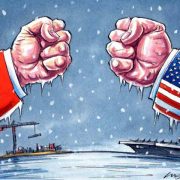Is Iran the real next victim of the Syrian war? And is China after that?
On April 18, China’s sabre rattling on the Taiwan strait, with its first naval maneuver there ever, reminded the world how easily the current tit-for tat- of trade tariffs between Beijing and Washington could escalate into a real war. Beijing is saying it won’t accept that Taiwan, de facto independent, but considered an integral part of China, will be used to try to up the ante of the present political confrontation with the US. Beijing raises the stakes first. But Taiwan is not an isolated element. It is complex game with many moving parts reaching out to the Mediterranean Sea.
Shortly after the US bombed alleged chemical installations in Syria, American president Donald Trump scrapped new sanctions against Russia. Trump then reinforced the impression in the West1] that the Syrian bombing was some shadow play between Washington and Moscow. The US informed Russia of the military action, and Russia agreed provided the action would be limited and perhaps also that many missiles would be hit by Damascus defense forces.
In the very same hours, the US banned Chinese telecom producer ZTE from buying supplies in America for seven years[2] As astute Thai political observer Pansak Vinyaratn noticed, the real sanctions hitting technological innovation against China are starting to roll in, after many vague words about raising tariffs on Chinese imports.
That is, the US seems careful not to wage war on two fronts, Russia and China. As we wrote earlier China appears to be the main adversary in this new “cold war,” and Russia is the secondary adversary that could be flipped.
If this is the big picture, the Syrian theater is just a sideshow that could help keep the Russians engaged and bleeding, but not dead.
Meanwhile the Iranians are drowning in a fight against the Sunni rebels, supported by Turkey, and are backing the weak Shia Palestinians, dreaming of a fight with Israel. With a smaller economy and larger involvement compared to the Russians, Tehran could be easily bankrupted by the Syrian war, as happened with the USSR in Afghanistan in the 1980s. The recent wave of anti-government protests in Iran could be just a foretaste of that. Iran can’t withstand Western sanctions and an expanding war.
Iran intervened in Syria when its leader Assad was about to be toppled by US-sponsored Sunni rebels. Teheran did that because of its old links with the Shiite Damascus regime, but also because it feared that the wave of Jasmine revolutions would hit Iran right after having overthrown the leadership in Syria.
Tehran’s smart move now, however, would be to withdraw from Syria, give up any and all nuclear ambition, cut a deal with Israel, and start over. But the fissures of the regime make all of this difficult. The ruling ayatollah would have to admit failure and thus could be overthrown by popular protests.
Then Tehran would rather roll its dice in a fight in Syria that pits itself against Israel, the “archvillain” of the Muslim masses, and thus have the hope of gaining brownie points at home and abroad for a “heroic” last stand against “American imperialism” and its Zionist allies.
If this is the case, a crisis of the Tehran regime could be just months away, and there would be no need to bomb Iranian nuclear facilities, but tougher sanctions could be helpful to further cripple Iran.
However, it’s possible the US and Israel believe Tehran can still weather a couple of years of war in Syria and in the meantime could manage to build an actionable nuclear arsenal.
For all of this, it would be useful to have Russia on board, and Russia—with the ruble in free fall and its leader Vladimir Putin under siege internally and externally—would need to stop the Syrian bleeding soon and have something to show for it.
The problem would be what could happen in the region after that—and what China will do, as its Belt and Road Initiative needs to go right through the Middle East, and Russia is its new best buddy.
[1] See for instance Fabio Mini in Il Fatto Quotidiano, April 16, 2018.
[2] See for instance https://asia.nikkei.com/Business/Companies/US-bans-Chinese-telecom-maker-ZTE-from-buying-parts-for-7-years.






Francesco, There is no journalistic comment in the U.S. that comes close to your brilliant analysis